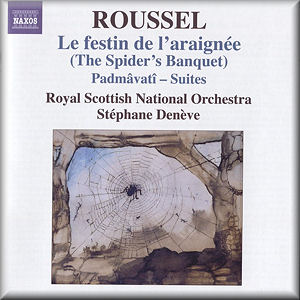 |
 |
|


alternatively
CD: MDT
AmazonUK
AmazonUS
Sound
Samples & Downloads |
Albert ROUSSEL (1869-1937)
Le festin de l’araignée (The Spider’s Feast), Op 17, complete
ballet (1912) [32:27]
Pâdmavatî, two suites from the Opera-Ballet (1918) [22:15]
 Royal Scottish National Orchestra/Stéphane Denève
Royal Scottish National Orchestra/Stéphane Denève
rec. 4-5 October 2010, Henry Wood Hall, Glasgow, Scotland
 NAXOS 8.572243 [54:42]
NAXOS 8.572243 [54:42]
|
|
|
When Naxos issued Stéphane Denève’s recordings of Albert Roussel’s
symphonies as a 4 CD box set, I snapped it up - having never
heard a note of Roussel - and devoured it with gluttonous delight.
Roussel is a genius, but he’s slipped through the cracks because
his music is so hard to pigeonhole. Sometimes he’s a Debussian
impressionist, as in the ballet Le marchand de sable qui
passe; sometimes he writes like the Ravel of Mother
Goose, as in Le Festin de l’araignée (featured
here), sometimes he blends that French sound with a brash, muscular
exuberance in the manner of Respighi (Symphony No 3, Bacchus
et Ariane), and the rest of the time he’s his own incomparable
self. So the fact that Naxos is offering us one more (alas,
final!) volume in its Roussel series is a terrific treat.
Le Festin de l’araignée, variously translated on this
CD as “The Spider’s Feast,” “The Spider’s Banquet,” and (incorrectly)
“The Spider’s Web,” is a 1912 ballet presenting the lives of
insects in a garden; the booklet notes inform me that the insects
are used to merrily ape the foibles of human behavior. This
is the complete ballet, with wonderfully named cues like “Entrance
of the dung beetles”, and the entire second part is a fourteen-minute
depiction of the birth, dancing, death, and funeral (!) of a
mayfly.
This is from the height of Roussel’s impressionistic period,
when his style had much in common with Debussy and Ravel; that
much is obvious from the very beginning, scored with tenderness
for flute over muted strings. There is an assortment of striking
coloristic effects associated with various insects; the fruit
worms, for instance, inch forward slowly in a cloud of surprising
prettiness, while the mantises strike a gruffer tone and the
ants dart about with surprisingly graceful agility. The mayfly’s
dance is a highlight, marked by a brief but winsome violin solo.
At the very end of the mayfly’s funeral, the flute melody from
the opening returns, bringing this gentle, quiet, softly witty
ballet to a close.
The opera-ballet Pâdmavatî, and the two suites recorded
here, are almost completely unknown - there’s a full recording
helmed by Michel Plasson on EMI
- which makes it more of a pity that they’re also nearly impossible
to describe. Can I just say they’re absolutely ravishing and
leave it there? This is Roussel at his most Roussel-like: mysterious,
exotic, with darker tones foreshadowing the Symphony No. 2,
but also with bounding, energetic dances, a seductive flute
solo, spooky harp strumming, and a finale which nearly works
itself into hysterics several times before the brass and bass
drum are calmed down by a gorgeous melody from the cellos. The
sheer amount of stuff Roussel manages to cram into 22 minutes
is unbelievable.
I still remember my thought upon hearing Roussel for the first
time, when Naxos issued that box set of the symphonies: “Where
has this composer been all my life?!” A glance at my
log shows that I’ve listened to at least one performance from
this five-disc series about once every three days so far this
year. The Suite in F, with its glittering merriment; the compact
punch of the Third and Fourth symphonies; the nightscapes of
the First Symphony and Le marchand de sable qui passe;
the sheer hyperactive thrill ride of Bacchus et Ariane;
now, too, the hypnotic Indian dreamland of Pâdmavatî.
All aided by the fact that the Royal Scottish National Orchestra,
under Stéphane Denève, have maintained an amazingly high standard
of play throughout the series, with stunning brass playing and
some of the best sound Naxos has ever recorded. In fact, this
is one of the best series Naxos has ever released, full stop,
and I’m very sad indeed that it is ending without tackling the
ballet Aenéas, the choral Psalm 80, and the
very brief concertos for cello and piano. If one of the concertos
had appeared here, everything else would have fit on a sixth
and final disc. As is, a Timpani
CD containing both Aenéas and Psalm 80
is the best way of completing your collection.
Anyway: if you’ve been collecting this series, you will need
this CD. If your Roussel discs date from the era of Jean
Martinon, Michel Plasson and Charles
Munch, you should know that the glorious digital sound does
not entail any compromise in energy or idiomatic orchestral
sound. If you somehow have yet to hear Roussel, my advice isn’t
to buy this album as a starter. My advice is to buy all five
in one go. You’ll understand when you suddenly want to shout:
“Where has this composer been all my life?!”
P.S. I didn’t think much of the cover painting until I turned
the CD case over and saw the name of the artist.
Brian Reinhart
|
|




 All Nimbus reviews
All Nimbus reviews








